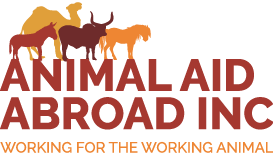APOWA Aug Update - Easing Suffering of 101 Animals and Caring for Those Affected by the Cold and Rain
Over the past month, APOWA and their dedicated mobile clinic has reached an impressive 101 animals, including horses and oxen—providing them with essential healthcare services that directly benefit both the animals and their owners.
During this reporting period, the team successfully vaccinated 376 animals and connected with 32 animal owners through the helpline desk service.
Educational programmes have reached 81 animal owners, empowering them with knowledge about nutrition, hygiene, and disease prevention. Additionally, 15 community volunteers have been trained in basic first aid, receiving five first aid kits to ensure swift care for animals in need.
Eye Infection – Nilagiri Suffering from an eye infection caused by worms and allergies, this animal was treated after the team responded to a call for assistance.
Treatment Statistics
Number of Animals Examined and Treated:
Horses: 19
Cattle: 64
Total: 83
Number of Animals Examined with Advice Only:
Horses: 5
Cattle: 13
Total: 18
Stomach Infection & Colic Pain – Nilagiri This animal was treated for a stomach infection and colic pain due to food poisoning. After receiving a call for help, the team was on-site to provide the necessary care.
Key Activities
Rural Mobile Vet Clinic
The team has been actively treating and examining working animals that lack access to veterinary care. Through vaccinations, deworming, and routine examinations, 83 animals have been treated and 18 others received advice only. Regular health monitoring has proven to be a significant success, positively impacting the lives of these hardworking animals and supporting the livelihoods of local tribal communities.
Vaccination Drives
Successful vaccination drives have been conducted, administering 242 vaccines for Lumpy Skin Disease (LSD) and 134 vaccines for Foot-and-Mouth Disease (FMD), protecting these animals from common and severe health issues.
Veterinary Helpdesk
The helpline desk service has received positive feedback, with 32 animal owners accessing it for quick responses and valuable information on veterinary care. Owners have been guided on nutrition and vaccination schedules, ensuring they are well-informed about their animals’ needs.
Training on Animal Welfare
Training sessions have been delivered to 15 community volunteers, focusing on animal welfare and basic first aid. These engaging workshops have been led by experienced veterinarians, who will continue to mentor these volunteers, ensuring they are well-prepared to respond to emergencies in their communities.
Five first aid kits have been distributed to volunteers, which are crucial for administering immediate care to injured or ill animals. The team will monitor the use of these kits to assess their effectiveness in enhancing the well-being of working animals.
Workshops for Animal Owners:
Training programmes have attracted 81 animal owners, covering essential topics such as proper feeding, disease prevention, and animal welfare practices. These sessions have been designed to provide owners with the knowledge and skills necessary for the effective management of their working animals.
Septic Wound – Cuttack Sustaining a septic wound from a cart during transportation, this animal was treated at a clinic, helping to prevent further infection.
Follow-Up Visits
To ensure the ongoing health of animals previously treated, follow-up visits have been conducted for two horses and three bullocks. During these visits, veterinarians have assessed the animals’ health, addressed any new concerns, and communicated with owners to guarantee continued care. Additionally, 32 vaccinated animals have been monitored for any adverse reactions to ensure their wellbeing.
Additional Initiatives
With the rainy season impacting hygiene in cattle sheds, the team provided cleaning supplies to each animal owner to aid in disinfection. This initiative not only improved the living conditions for the animals but also educated owners on essential animal welfare practices.
Cold, Cough & Fever – Nilagiri Caught in the rain, this animal developed a viral fever and was treated at a scheduled clinic, helping it recover quickly.
APOWA is making a significant difference in the lives of both animals and their owners, fostering a community committed to the health and well-being of their working animals.
Thank you to our donors for your continued support as APOWA strives to create a better future for animals in India!


















